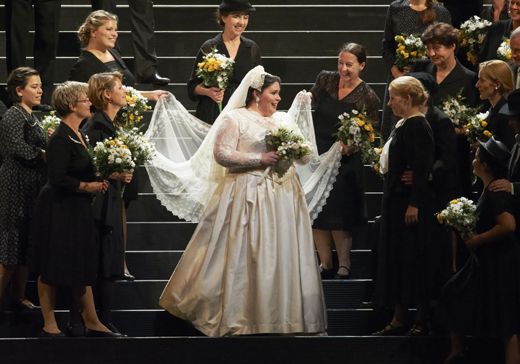 Austria G. Verdi: I Vespri Siciliani, Wiener Staatsoper orchestra and chorus, Gianandrea Noseda (conductor), Vienna Staatsoper, 12.9.2012 (JMI)
Austria G. Verdi: I Vespri Siciliani, Wiener Staatsoper orchestra and chorus, Gianandrea Noseda (conductor), Vienna Staatsoper, 12.9.2012 (JMI)
Cast:
Arrigo: Burkhardt Fritz
Elena: Angela Meade
Monforte: Gabriele Viviani
Procida: Ferruccio Furlanetto
Bethune: Alexandru Moisiuc
Vaudemont: Hans Peter Kammerer
Ninetta: Alisa Kolosova
Danieli: Marian Talaba
Tebaldo: Carlos Osuna
Roberto: Tae-Joong Yang
Production:
Production: Wiener Staatsoper
Direction: Herbert Wernicke
Sets, Costumes and Lighting: Herbert Wernicke

This stage production was by the late (2002) Herbert Wernicke, and had its premiere here in 1998. Herr Wernicke not only managed the stage direction, but designed the sets, costumes and lighting. The work is probably the closest one can get to a concert version, or, if you prefer, a semi-staged performance in a theatre because the only sets for all 5 acts is a huge 60 step staircase that occupies the entire stage. Almost all of the action takes place on the steps, with the exception of a few scenes in a narrow space at the front. Apart from the stairs, the only ‘scenery’ is an iron gate for the entrance to the prison and a small table and chair for the third act. The plot has been transferred from the 13th to the 19th century and the costume designs consists simply of having the Sicilians dressed in black and the French soldiers in blue. The only exception is Elena’s white wedding dress in the last act.
There is no mention of a revival director in the programme so presumably the stage direction followed Herbert Wernicke’s original instructions. The upshot was that I have seen many concert versions of opera with more life on stage than this performance and I genuinely don’t understand why Wiener Staatsoper keeps the production in its repertoire.
Leading the musical direction was Gianandrea Noseda, the current music director of Turin’s Teatro Regio. He delivered a remarkable performance, conducting with energy and a fine sense of Verdian style. He was particularly good in the ensembles, and I noticed that he had already conducted this opera in Turin. The overall result was more interesting conducting than Herr Welser-Möst provided for Don Carlo, completely without excessive orchestral volume at any time. Altogether the Staatsoper’s orchestra and chorus gave outstanding performances.
Burkhard Fritz was Arrigo and he was less impressive than I expected. Curiously, many people seem to believe that more important voices are necessary for Wagner operas than are needed than for Verdi. However, Burkhard Fritz, who is well known for his Wagner roles – this year he was much praised as Parsifal at Bayreuth – proved to be an Arrigo with too small a voice which was also poorly delivered. In his big aria at the prison he cracked twice and would have done better I think, to avoid difficult notes rather than attempt them and fail.
The best performance in the cast came from soprano Angela Meade in the character of Elena. She is a young singer who is destined to have an important career in my view: her voice is wide and attractive, she knows how to handle it and proves very reliable at both ends of the tessitura. I found her more expressive in her singing here than just over a month ago when I heard her in Perelada’s Trovatore.
Gabriele Viviani was a good interpreter of Monforte, singing with taste and clearly formed intent. I think however that his voice is more suited to (say) Marcello in La Bohème than to becoming a heavyweight Verdi baritone. He would make an excellent baritone in Donizetti and some Verdi roles, but he lacks the vocal heft for the bigger roles, including Monforte. Incidentally, although it is not Signor Viviani’s personal responsibility, something more might have been done to make this Monforte look like Arrigo’s father rather than his younger brother.
The fourth protagonist of the opera was Ferruccio Furlanetto as Giovanni da Procida. I have to confess that I never much liked Sig. Furlanetto’s voice myself, but what is equally certain is that he is a remarkable singer and a true artist on stage. Procida’s lust for revenge came over to the audience perfectly.
The secondary characters were well covered by singers who in other theatres could be main protagonists, such is the standard provided routinely by Wiener Staatsoper. The theater was almost sold out and the audience entusiastically applauded the well-known Procida aria and also Elena’s aria from the prison. There was also some slight booing for Arrigo after his aria.
José Mª. Irurzun